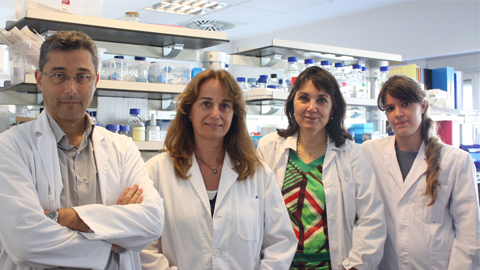Gene therapy protects against age-related cognitive and memory deficits

31/10/2017
Researchers from the Institute of Neurosciences at the Universitat Autònoma de Barcelona (INc-UAB) and the Vall d'Hebron Research Institute (VHIR) are the first to demonstrate that regulation of the brain's Klotho gene using gene therapy protects against age-related learning and memory problems in mice.
The study, published in Molecular Psychiatry (Nature group), opens the door to advancing in the research and development of therapies based on this neuroprotective gene.
Researchers from the UAB demonstrated in a previous study that Klotho regulates age-associated processes, increasing life expectancy when over-expressed and accelerating the development of learning and memory deficiencies when inhibited.
Now they have demonstrated in vivo for the first time that one dose of this geneinjected into the central nervous system prevents the cognitive decline associated with ageing in old animals which were treated at a younger age.
The results, which form part of the PhD thesis of Anna Massó, first author of the article, are part of a study led by INc-UAB researchers Dr Miguel Chillón, ICREA researcher at the Department of Biochemistry and Molecular Biology of the UAB and the VHIR; Dr Lydia Giménez-Llort from the Department of Psychiatry and Legal Medicine of the UAB; and with the collaboration of Dr Assumpció Bosch, also from the Department of Biochemistry and Molecular Biology.
“The therapy is based on an increase in the levels of this protein in the brain using an adeno-associated viral vector (AAV). Taking into account that the study was conducted with animals which aged naturally, we believe this could have the therapeutic ability to treat dementia and neurodegenerative disorders such as Alzheimer's or multiple sclerosis, among others”, Miguel Chillón points out.
The researchers patented their therapy and have licensed it to Kogenix Therapeutics. The company includes UAB participation and is based in the United States. It was launched by Dr Miguel Chillón and Dr Assumpció Bosch, together with the entrepreneur Menachem Abraham and Dr Carmela Abraham, professor of Biochemistry and Pharmacology at the Boston University School of Medicine, a pioneering centre in the study of Klotho in the central nervous system for more than a decade.
The objective of Kogenix is to achieve the initial capital needed to advance in the pre-clinical trials already being conducted with animal models of Alzheimer's disease. This will give way to the development of a drug to be used in gene therapy against neurodegenerative diseases based on small molecules which enhance the expression of the gene and/or the use of fragments of the Klotho protein itself.
“In basic research studies and clinical trials the AAVs have shown to be safe and effective in the implementation of a central nervous system gene therapy. In fact, the Food and Drug Administration made the first gene therapy available in the United States in August and additional approvals are expected”, Dr Assumpció Bosch states.
Article: A Massó, Angela Sánchez, A Bosch, L Gimenez-Llort, M Chillon. “Secreted αKlotho isoform protects against age-dependent memory deficits.” Molecular Psychiatry (2017) 00, 1–11. DOI:10.1038/mp.2017.211